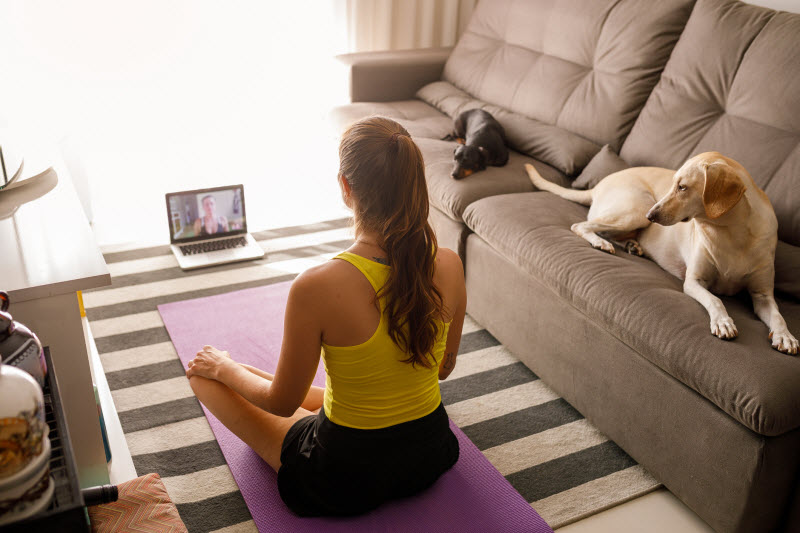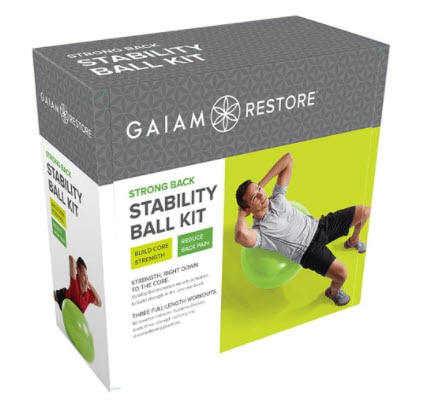With many of us still avoiding gyms and
exercising at home, it can be hard to
stay on track with fitness. Whether you lack motivation, can’t seem to find the time or don’t have the space or resources you need, not exercising enough is something we all struggle with on occasion. Having tools to keep yourself accountable can help. Here’s why.

What is accountability?
Accountability involves taking responsibility for your actions. In terms of exercise, this can be especially tough. You may have the best of intentions, but situations or a conflicting mindset can take over, and all your plans end up being scrapped. When a routine is in place or others are involved (such as a fitness buddy or trainer), it’s easier to hold ourselves accountable. But when it’s just us, we often have to put more energy into sticking with plans.
How to be accountable
Developing accountability can take some work. If we do not have a set plan set in place, any number of things can veer us of course. For starters, it’s important to define your
fitness goals and what you want to accomplish. Remember to start small and set realistic goals. Then, create a plan to reach your goals through a series of small, actionable steps.
Also, it’s important to ask yourself, what is your motivation? Are you trying to
lose weight?
Build muscle? Become
more flexible? Be sure that your focus is directed toward the end-goal of that motivation. Consider the benefits of accomplishing your goal, and remind yourself of them often – whether that’s through daily inspirational messages, conversations with friends or rewards to look forward to after you’ve completed a step.
Tips for accountability with at-home exercise
After you’ve defined your goals and created an action plan, the following tips can help you to keep yourself accountable on your journey.
1. Commit to a type of exercise you love.
What’s your preferred type of exercise? Do you enjoy moving with aerobics or Zumba classes? Is stationary exercise, like spin class, better for you? Are slower, gentle workouts like
yoga or pilates your thing? Doing what you like increases chances that you’ll stick with a routine.
If in-person classes aren’t possible, find a studio that offers
online exercise classes and sign up for a few sessions. Signing-up for virtual classes that you have to pay for can help keep you accountable – you don’t want to lose money you’ve paid!
2. Schedule your workouts – and set a reminder.
Once you’ve decided on the type of exercise you like doing, create a calendar of days and times that work best for you. Digital calendars are good, but it can be helpful to post a large, print-out calendar on your refrigerator or wall so you can refer to it daily. Then, set reminders on your phone or laptop to alert you to scheduled workout times.
3. Keep track of your exercise efforts.
Seeing what you’re accomplishing, and keeping track of progress, can be very motivating, as well as help you to stay accountable. Tools like the Fitbit, Apple Watch, a smartphone or other tracking device let you monitor workouts and keep track of your heart rate, steps and more. Bonus: Some devices and apps also provide food tips, motivation tips, exercise ideas or can match you up with a fitness friend.
4. Partner up if possible.
Although many are exercising solo right now, not everyone wants that! Check in with friends and family to see if they might join you for an online class or a socially distanced walk or run. Besides helping you to stay accountable, partnering up makes workout time fly by – so you might do more or go further than you would on your own.
5. Keep equipment visible.
Having to set up and take down equipment every time you exercise is a real deterrent. Seeing props set out and ready to use is a good reminder to get moving! Even if you only have 15 minutes to engage – everything will be ready to go when you are. Consider arranging resistance bands,
stability ball,
strap,
foam roller and
yoga mat somewhere visible. They’re easy to use and won’t take up much room.
6. Get out of the house.
Staying indoors, in the same space, all of the time? No wonder you aren’t moving! Every day, make a point of getting outside. Even if you just walk for 20-30 minutes, you’ll squeeze in some exercise and enjoy the benefits of being outdoors. For example, getting fresh air helps clear the mind and relieves stress. Like other exercise reminders, set a timer to break, head out the door and walk around the neighborhood.
7. Keep track of your progress.
Besides keeping track of your exercise efforts, don’t forget to track your progress. At the end of every workout session, write down what you did, how much time you spent and any key results (such as lifting more weight than the previous day). At the end of the week, you can see all that you’ve accomplished. Over time, you’ll be able to review the path that led you to accomplishing your goal!
8. Reward yourself!
At the end of a week, after reviewing what you’ve accomplished, it’s time to reward yourself. Splurge on a
(healthy) treat, buy a new workout outfit or small piece of equipment, rent a new movie you’ve been wanting to see. Looking forward to these rewards is one of the most fun ways to hold yourself accountable. Get creative with your rewards!
Featured products:










